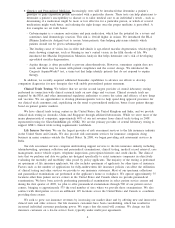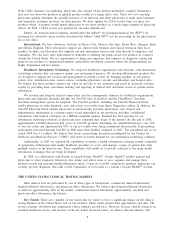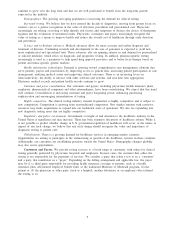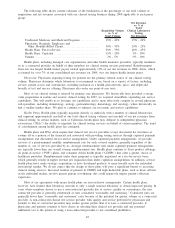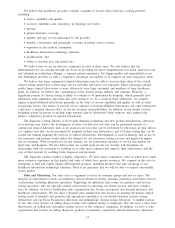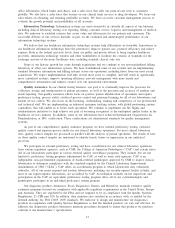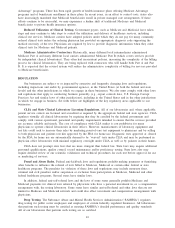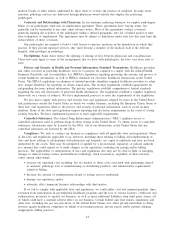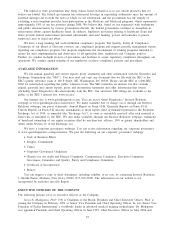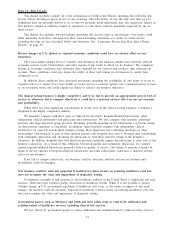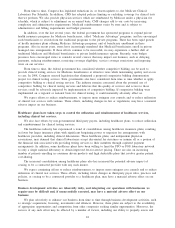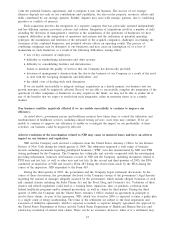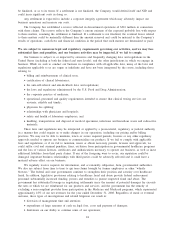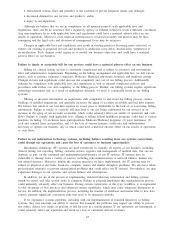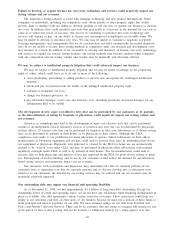Quest Diagnostics 2008 Annual Report Download - page 28
Download and view the complete annual report
Please find page 28 of the 2008 Quest Diagnostics annual report below. You can navigate through the pages in the report by either clicking on the pages listed below, or by using the keyword search tool below to find specific information within the annual report.Advantage” programs. There has been rapid growth of health insurance plans offering Medicare Advantage
programs and of beneficiary enrollment in these plans. In recent years, in an effort to control costs, states also
have increasingly mandated that Medicaid beneficiaries enroll in private managed care arrangements. If these
efforts continue to be successful, we may experience a further shift of traditional Medicare and Medicaid
beneficiaries to private health insurance options.
Reduced Utilization of Clinical Testing. Government payers, such as Medicare and Medicaid, have taken
steps and may continue to take steps to control the utilization and delivery of healthcare services, including
clinical test services. Medicare carriers have adopted policies under which they do not pay for many commonly
ordered clinical tests unless the ordering physician has provided an appropriate diagnosis code supporting the
medical necessity of the test. Physicians are required by law to provide diagnostic information when they order
clinical tests for Medicare and Medicaid patients.
Medicare Administrative Contractors. Historically, many different local intermediaries administered
Medicare Part A and many different local carriers administered Medicare Part B (which covers services provide
by independent clinical laboratories). They often had inconsistent policies, increasing the complexity of the billing
process for clinical laboratories. They are being replaced with contractors who will handle both Part A and Part
B. It is expected that the revised system will reduce the administrative complexity of billing for services provided
to Medicare beneficiaries.
REGULATION
Our businesses are subject to or impacted by extensive and frequently changing laws and regulations,
including inspections and audits by governmental agencies, in the United States (at both the federal and state
levels) and the other jurisdictions in which we engage in these businesses. We also must comply with other laws
and regulations that apply to conducting business generally (e.g., export controls laws, U.S. Foreign Corrupt
Practices Act and similar laws of other jurisdictions), including in the United States and in the other jurisdictions
in which we engage in business. Set forth below are highlights of the key regulatory areas applicable to our
businesses.
CLIA and State Clinical Laboratory Licensing Regulations. All of our laboratories and, where applicable,
patient service centers are licensed and accredited as required by the appropriate federal and state agencies. CLIA
regulates virtually all clinical laboratories by requiring that they be certified by the federal government and
comply with various operational, personnel and quality requirements intended to ensure that the services provided
are accurate, reliable and timely. The cost of compliance with CLIA makes it cost prohibitive for many
physicians to operate clinical laboratories in their offices. However, manufacturers of laboratory equipment and
test kits could seek to increase their sales by marketing point-of-care test equipment to physicians and by selling
to both physicians and patients test kits approved by the FDA for home use. Diagnostic tests approved or cleared
by the FDA for home use are automatically deemed to be “waived” tests under CLIA and may be performed in
physician office laboratories with minimal regulatory oversight under CLIA as well as by patients in their homes.
CLIA does not preempt state laws that are more stringent than federal law. State laws may require additional
personnel qualifications, quality control, record maintenance and/or proficiency testing. State laws also may
require detailed review of our scientific validations and technical procedures for each test before approval for use
or marketing of services.
Fraud and Abuse Rules. Federal anti-kickback laws and regulations prohibit making payments or furnishing
other benefits to influence the referral of tests billed to Medicare, Medicaid or certain other federal or state
healthcare programs. The penalties for violation of these laws and regulations may include monetary fines,
criminal and civil penalties and/or suspension or exclusion from participation in Medicare, Medicaid and other
federal healthcare programs. Several states have similar laws.
In addition, federal anti-self-referral laws and the laws of some states generally prohibit Medicare and
Medicaid payments for clinical tests referred by physicians who have a personal investment in, or a compensation
arrangement with, the testing laboratory. Some states have similar anti-self-referral and other laws that are not
limited to Medicare and Medicaid referrals and could also affect investment and compensation arrangements with
physicians.
Drug Testing. The Substance Abuse and Mental Health Services Administration (“SAMHSA”) regulates
drug testing for public sector employees and employees of certain federally regulated businesses. All laboratories
that perform such testing must be certified as meeting SAMHSA’s detailed performance and quality standards.
All of our laboratories that perform such testing are so certified.
16


